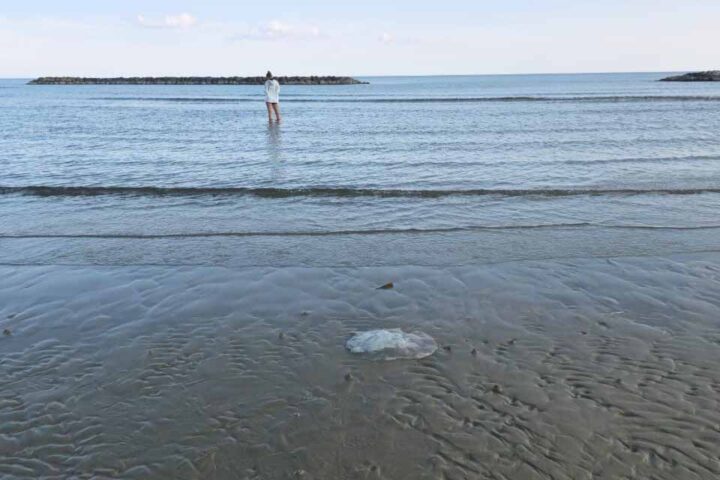The Mediterranean is becoming a prominent and vulnerable climate change “hotspot” threatening the marine ecosystem with global warming that usher’s tropical jellyfish to Cyprus shores.
Marine biologists are sounding the alarm over how accelerated climate change has exacerbated existing environmental problems in the Mediterranean Basin caused by a combination of changes in land use, increasing pollution and changing biodiversity.
Cypriot Marine Biologist Antonis Petrou at AP Marine Environmental Consultancy Ltd, said the average temperatures in the Mediterranean region have already risen by 1.5°C since the pre-industrial era, 0.5°C more than the global average.
He told the Financial Mirror, this has resulted in the sea level rising by 6 cm and seawater acidity has significantly increased, creating, among others, the perfect environment for the introduction of invasive tropical marine life species from the Red Sea and the Indian Ocean.
“Helped by the rising sea levels and drawn by the now warmer waters of the Mediterranean, tropical species such as the Lionfish and the silver-cheeked toadfish, both extremely toxic have invaded the Mediterranean and multiplied to worrying numbers,” said Petrou.
He said the problem with these species is that they are highly toxic, dangerous to humans and other species alike as they are pushing endemic species westwards.
According to Marine biology bibliography, the Mediterranean, even though representing a small part of the world’s oceans, is inhabited by an unusually rich and diverse biota.
It hosts approximately 17,000 species, representing 4–18% of the world’s marine biodiversity.
“Eastern Mediterranean has seen biodiversity decrease in recent years because of these tropical fish which entered the sea’s basin from the Suez Canal, helped by the recent widening of the Canal and the rising sea level.”
Egypt has opened a major expansion of the Suez Canal, which deepens the main waterway and provides ships with a 35km channel parallel to it.
The expansion aims to increase the traffic handled by the canal.
The Suez Canal is considered to be the main vector of the introduction of non‐indigenous marine species into the Mediterranean Sea.
It provides an artificial navigable connection with the Red Sea and the Indo‐Pacific Ocean, a gateway for invasive species.
Dangerous fish
The silver-cheeked toadfish is an extremely poisonous marine bony fish in the family Tetraodontidae (pufferfishes).
Pterois is a genus of venomous marine fish, commonly known as lionfish, native to the Indo-Pacific, are known for their venomous fin rays, making them excellent predators and hazardous to fishermen and divers.
“The increased rates of introduction and spread of marine alien species may represent a supplementary stress factor to Mediterranean marine native biota already challenged by climatic abnormalities,” Petrou noted.
He argued that due to the dramatically accelerating rate of such introductions and the sheer magnitude of shipping traffic, the Mediterranean may be considered as a true hotspot of marine bioinvasions.
“All the above factors make environmental management of such an issue particularly difficult”.
Petrou said that the situation in the Mediterranean will worsen as models estimate an increase in average surface temperatures ranging from 2.2-5.1°C from 2080-2100.
For the same period, the models indicate pronounced rainfall regime changes in the Mediterranean and estimate that precipitation might vary between -4% and -27%.
“Changes in weather patterns have also played a role in displacing endemic species westwards.
Whereas Cyprus had not been experiencing winds from the East in the past, now frequent gusts of wind blowing from the East push species like Jellyfish westwards.
That is why every few weeks we hear of jellyfish floating in the waters of Famagusta and Larnaca.”
The Marine Biologist said the introduction of these invasive species not only pose a threat to the biodiversity of the Mediterranean Basin, but also the economies of countries.
“Firstly, fishing is significantly affected by endemic fish being pushed westwards by invasive, toxic species, which cannot be fished for consumption by humans,” said Petrou.
He explained that the species in question are also attacking fishermen’s nets eating away smaller species such as squid and octopus.
“These fish are particularly harmful to humans, which could have an immediate effect on tourism, as they pose a threat to swimmers. Frequent visits from jellyfish could destroy tourism in an area.”
“Unfortunately, there is not much Cyprus can do, as this is a global phenomenon caused by global warming over which we have no control”.
Petrou said the government should encourage the fishing of these species with financial incentives and create some sort of barrier with Egypt at the Suez Canal to prevent large numbers of these fish from entering the Mediterranean.










